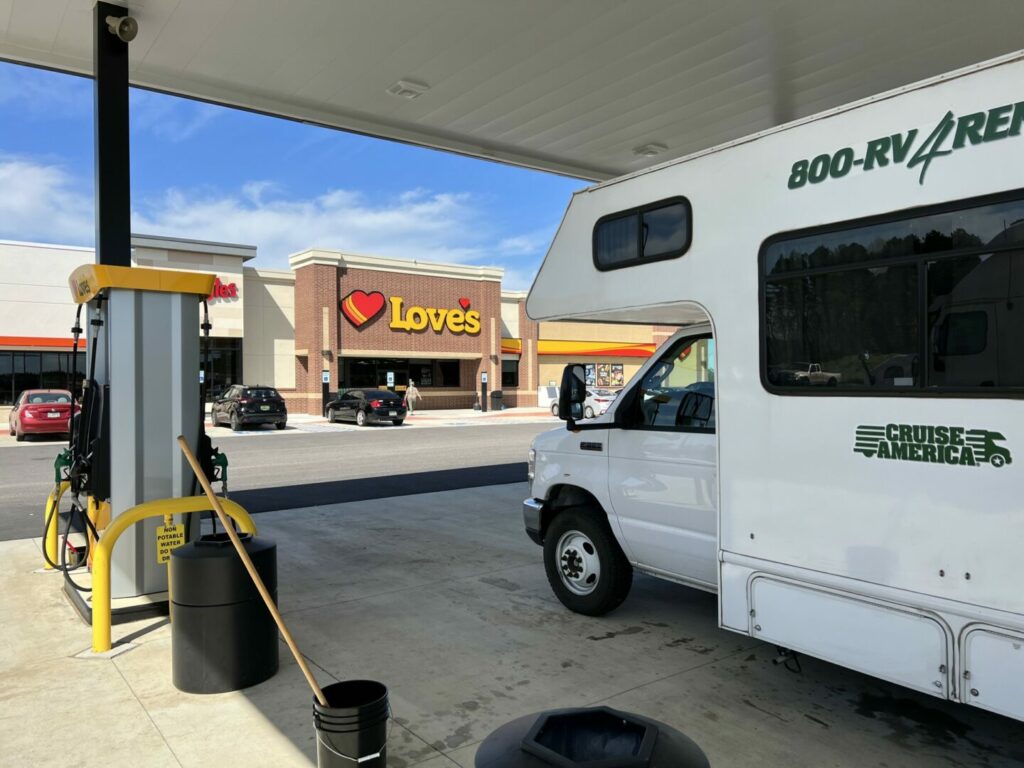Table of Contents Show
If your idea of RVing comes from watching movies like “Lost in America,” “National Lampoon’s Christmas Vacation,” or “The Long Long Trailer,” then you’re in for a surprise. There are quite a few myths about RVing that it’s time to debunk so you can head out on your own cross-country adventures. Let’s set the truth straight!
Why Do People Choose to RV?
RVing is a way for people to see the country without having to lug suitcases and duffle bags from one hotel to another. An RV is also a home. When people travel in an RV, they get to come back to their homes after a day of sightseeing. There’s convenience and comfort in RVing.
Plus, some days, RVers don’t even have to leave their campers to enjoy a beautiful sunset or stunning view. They can sit outside around a campfire surrounded by the towering peaks of the Rocky Mountains or enjoy a cup of coffee by their campsite windows, staring into the crashing waves of the Atlantic Ocean.
Common Myths About RVing
If you’re considering the RV lifestyle and whether or not this type of travel is right for you, you’ve probably heard of some of these common myths about RVing. Some may be half-truths, while others are flat-out not true. Let’s dive in and take a closer look!
1. RVing Is Only for Retired Couples
This is not true. RVing is for anyone. Over the last few years, RVing has actually increased among young people. This is why Class B vans have been selling like crazy. Young solo travelers want to see the world. People don’t want to wait until they retire. Who knows what their health and financial stability will be like in their 60s?
Not only are young solo travelers hitting the road, but families are also seeking adventure. Remote working has led to an influx of families who can homeschool and work while traveling. They can enjoy amazing experiences and share memorable bonding moments together because of the RV lifestyle.

2. RVs Are Too Difficult to Drive
This one might be a half-truth. RVs aren’t all that easy to drive. That would be another myth. But they also aren’t difficult, either.
It’s just a learning curve. For someone who has never driven anything larger than a Honda Accord, towing a 40-foot fifth wheel is intimidating. But there are driving classes newbies can take and large parking lots where new owners can practice. Driving a Class A motorhome may seem overwhelming, but once you learn the ropes, you’ll enjoy the ride in one of those luxurious motorcoaches.
3. Full-Time RVing Saves Money
This myth may be true for some travelers, but don’t go into RVing thinking this is true for everyone. If your rent in San Francisco is $3,000 per month, then moving into an RV and traveling may indeed be cheaper. However, for the majority of travelers, this just isn’t true. RVing is either about the same or slightly more expensive.
Food costs vary across the country. Fuel prices fluctuate. Campground fees vary depending on where you stay and what type of accommodations you’re looking for. Pursuing the RV lifestyle full-time also means experiencing new places. Full-time travelers want to enjoy eating out at local restaurants or visiting local attractions. This is part of the lifestyle and adds to the overall budget.

4. New RVs Are Better Than Used RVs
There are pros and cons to both new RVs and used RVs. The general assumption that new RVs are better is a myth, however. If you’re looking for a spotless rig with all the bells and whistles and a warranty covering your travels for the first year, you’ll want to purchase a new RV. If you’re on a tight budget and want to purchase a rig you know has been tested and survived on the road, then you’ll want to purchase a used RV. So it really depends on what you’re looking for and what your budget allows.
Regardless, always hire an RV inspector before driving away with your newly purchased RV. Even new ones will arrive with certain things that need fixing. You don’t want to get caught up in repairs the first four weeks you’re traveling.
Pro Tip: If you’re not convinced that a used RV may be better than buying new, let’s take a look at these 8 Facts to Settle the Debate
5. Full-Time RVing Means Full-Time Vacationing
This myth is 100% wrong. Full-time RVers live in their RVs. This means they’re working, schooling, washing dishes, washing clothes, working on repairs, and doing life in an RV. That doesn’t mean they’re sitting on a beach towel catching rays day after day. The perks of this full-time lifestyle are certainly hiking adventures, sunset tours, and wildlife sightings, but these aren’t happening every day. Work, school, and chores make up most days.
6. RVs Are Too Expensive
Like the new RV versus used debate, the discussion over the prices of RVs is personal. Depending on your budget, you may feel like RVs are too expensive and have a hard time finding something that will hold up in a price range you can afford. However, with so many brands and options available, any traveler with any budget can likely find something that works.
There are small pop-up campers for less than $20,000 and entry-level fifth wheels for less than $40,000. Even if you want a drivable RV, you can find new models for less than $150,000. And if you buy used, that saves even more money.

7. Any Truck Can Tow Any RV
This is an absolute myth that needs to be debunked immediately. Don’t assume your Ford F150 pickup truck can tow your RV. Although Ford has a great track record for towing capacities, each truck is different and has its limits. Make sure to know the numbers on your truck so you can safely tow your RV from place to place.
You should know the towing capacity of your specific truck and not the capacity of the general brand and model. The truck bed length, engine, axle ratio, and cab size all affect the towing capacity. You don’t want to endanger yourself, your passengers, or anyone else on the road by driving a truck beyond its maximum towing capacity. Plus, you’ll be paying a lot in repairs for the beating it will take.
8. You Need a Special License to Drive an RV
Although this varies from state to state, most RVers don’t need any special license to drive an RV. This may change based on the weight of your Class A motorhome and your residence. Some states do have special licensing requirements for driving a vehicle weighing more than 26,000 pounds. You’ll want to read up on the requirements for where you live. But for most travelers, their rigs are far under 26,000 pounds and they have nothing to worry about when driving from place to place.
9. Families Can’t Full-Time Because of the Kids
As already mentioned, RVing isn’t just for retired folks. Families are hitting the road and even choosing to live in RVs and travel full-time because of the amazing experiences the lifestyle offers. Many kids who travel full-time love the lifestyle because of the hands-on learning and memorable moments shared with their families.
There are certainly challenges full-time RV families face that solo travelers or couples don’t have to experience. But the bonding experiences between siblings, parents, and kids make full-time RVing worth the day-to-day struggles.

10. RVing Means You’re “Roughin’ It”
Finally, some people may have the image of Cousin Eddie and his beat-up camper sitting in Clark Griswold’s driveway when they think about people who RV. In reality, RVs can be very luxurious. Class A motorhomes can cost half a million dollars for a reason.
From porcelain floors to granite countertops to spa-like bathrooms, RVs can have all of the bells and whistles you can imagine. But even the entry-level travel trailers that cost less than $30,000 are stylish and comfortable. RVing is not tent camping. Most travelers have everything they need and more.
Keep in Mind: Cousin Eddie’s RV is a classic! Is the Cousin Eddie RV the Most Famous RV Ever? Let’s take a look!
Don’t Believe Every Myth You Hear: Try RVing!
If these myths have kept you from experiencing the RV life, now you know the truth! Go out and enjoy traveling and seeing the country. Whether you’re a 20-something Gen-Zer, a 60-something retired Army vet, or a family of six with two dogs, the RV lifestyle might just be for you. Don’t believe every myth you hear. Otherwise, you might miss out on the greatest adventures of your life!
Are you going to try RVing?






